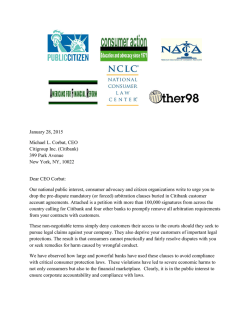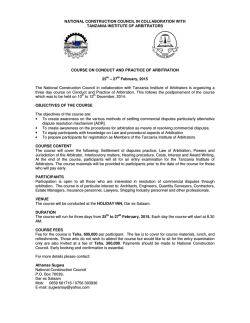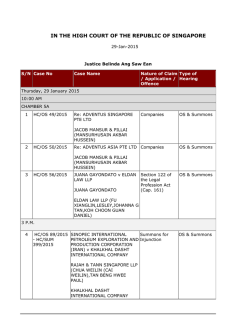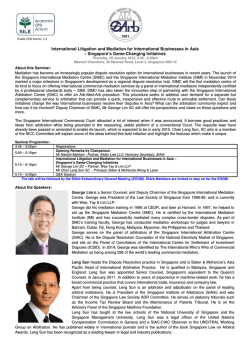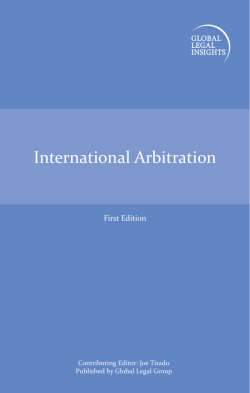
Arbitration Law – Developments in 2014
CLIENT UPDATE 2015 JANUARY DISPUTE RESOLUTION Arbitration Law – Developments in 2014 A) Introduction Singapore is now among the top five arbitral seats in the world. With its ever- increasing popularity, there has been a surge of arbitration-related litigation in the Singapore courts. In this Legal Update, we take a look at some of the noteworthy Singapore cases in the area of arbitration law in 2014, as well as their implications and influence. B) Arbitration Agreements Arbitration is based on the consent of the parties to submit their dispute before the tribunal. Therefore, before there can be any arbitration, there must first be an arbitration agreement. Arbitration agreements, while often standard in form, are sometimes complex in application. The cases below deal with the applicability and terms of an effective arbitration clause. (i) R1 International Pte Ltd v Lonstroff AG [2014] SGCA 56 Anti-suit injunction in support of arbitration – Incorporation of arbitration clause through standard terms In this case, the Singapore Court of Appeal had occasion to grant the apex court’s first known successful anti-suit injunction in support of arbitration, overturning a decision of the High Court. The Court also made important observations on the incorporation of standard terms and conditions intended to supplement key commercial terms that had been concluded orally or by email. The parties had entered into a series of five commodities trading agreements. In each instance, an email confirming the quantity and price of rubber to be delivered from the Supplier to the Purchaser was exchanged. The Supplier would then send its standard terms and conditions to the Purchaser. These terms contained an arbitration clause providing that disputes were to be resolved by arbitration. A dispute arose over the second transaction, and the Purchaser brought a claim against the Supplier before the Swiss Courts. The Supplier then sought an anti-suit injunction before the Singapore Courts. The question arose as to whether the Supplier’s terms, and thus the arbitration clause, had been incorporated into the agreement. The Court held that the Supplier’s terms had in fact been incorporated, and granted the Supplier’s antisuit injunction. On the facts, the Court held that the parties had contemplated that the basic terms of the email agreement would be supplemented by a set of standard terms, particularly due to the size and scope of the transaction and the industry practice. The Court also accepted that the applicable standard terms would be the Supplier’s terms, as the Purchaser’s acceptance of delivery, payment of invoice, and failure to raise any objection to the Supplier’s terms indicated acceptance. The Supplier was successfully represented by Paul Tan of Rajah & Tann Singapore. (ii) Oei Hong Leong v Goldman Sachs International [2014] 3 SLR 1217 Separate contracts with competing arbitration and jurisdiction clauses – Whether parties intended for arbitration clause to apply The dispute in this case was unusual in that it could potentially fall under either of two separate contracts between the parties; one of which contained an arbitration clause, while the other contained a non1 © Rajah & Tann Singapore LLP CLIENT UPDATE 2015 JANUARY DISPUTE RESOLUTION exclusive jurisdiction clause. The High Court had to determine which contract applied, and thus whether the dispute should go before the Courts or an arbitral tribunal. The Plaintiff client brought a claim against the Defendant investment bank for fraudulent misrepresentation leading to loss-making trades. The Defendant then sought to stay the proceedings, relying on an arbitration clause in an Account Agreement Pack between the parties. The Plaintiff in turn contended that a non-exclusive jurisdiction clause in a Master Agreement applied instead. The Court approached the issue as a question of the dispute resolution clause that the parties objectively intended to apply. This required an ascertainment of the parties’ intentions, which could turn on which contract had the closer connection to the claims. It was held that the Account Agreement Pack had a closer connection to the present dispute as the claims hinged on a clause within that agreement, which also contained a possible defence. The Account Agreement Pack also governed the parties’ banker-customer relationship out of which the alleged misrepresentation occurred. Therefore, the arbitration clause applied, and the Defendant’s stay of proceedings was granted. (iii) FirstLink Investments Corp Ltd v GT Payment Pte Ltd [2014] SGHCR 12 Arbitration agreement lacking choice of governing law – Determining validity and proper law of agreement It is not uncommon for parties to omit an express choice of law governing their international arbitration agreements, focusing on their contractual obligations rather than the potential breakdown of the relationship. In this case, the High Court provided guidance on how it would determine the governing law of an arbitration agreement in the absence of an express choice. The Plaintiff had contracted to use the Defendant’s online payment service. The contract contained an arbitration clause which provided that “Any claim will be adjudicated by Arbitration Institute of the Stockholm Chamber of Commerce”, but did not specify a governing law. Nonetheless, the Court held that the law of Sweden would govern the arbitration agreement. The Court upheld the general methodology of identifying the proper law of an arbitration agreement, which entails seeking the express choice, followed by the implied choice, and then the law which the arbitration agreement has its closest and most real connection with in the absence of any choice. While each case would turn on its own facts, the Court endorsed looking to the law of the seat of arbitration as the proper law. Here, the specific reference of disputes to the Stockholm Chamber of Commerce evinced an objective intention to elect the lex arbitri of Sweden as the curial law applicable to the arbitration. In the absence of factors pointing to the contrary, the law of Sweden would apply. C) Conduct of Arbitration In the course of actually conducting the arbitration, there are a number of issues that may arise requiring the assistance of the Courts to resolve. In this next section, we look at a couple of cases dealing with awards and arbitrators. (i) PT Perusahaan Gas Negara (Persero) TBK v CRW Joint Operation (Indonesia) [2014] SGHC 146 Interim or provisional arbitral awards – Enforceability before Singapore Courts It is not uncommon for arbitral tribunals to issue provisional awards, particularly for disputes in industries such as construction, where the immediacy of remedies is vital. Here, the High Court was faced 2 © Rajah & Tann Singapore LLP CLIENT UPDATE 2015 JANUARY DISPUTE RESOLUTION with the question of what constitutes a ‘provisional’ award, and whether such awards are enforceable before the Singapore Courts. The case involved a series of variation claims under a construction contract incorporating the FIDIC Conditions of Contract for Construction 1999, in which the dispute resolution system allows a contractor to obtain a speedy adjudication for payment from the employer, while maintaining the employer’s entitlement to arbitrate the underlying merits of the payment obligation at a later time. The initial interim award for payment may thus be seen as ‘provisional’. Here, the contractor in question had obtained an arbitral award to enforce the employer’s payment obligation pending final resolution of the underlying claim. The employer sought to challenge this award, alleging that it was prohibited under Singapore statute due to its provisional nature. However, the High Court held that provisional awards are not prohibited by Singapore legislation, thus clarifying a longstanding issue of arbitral validity in a manner that is consistent with Singapore’s proarbitration position. In any event, the Court was prepared to hold that the award in question was not provisional, but was final and binding as to the employer’s payment obligation. This decision is of particular importance to the construction industry, where the enforceability of provisional awards is vital. Contractors invariably perform services in advance of payment, and where a payment dispute arises, the interrupted cash flow can have serious or even permanent consequences for the contractor. A security of payment regime thus allows for contractors to resolve payment disputes on a prompt – albeit provisional – basis. The case has since gone on appeal to the Court of Appeal, with the apex court reserving judgment. It thus remains to be seen what the final outcome regarding the enforceability of provisional awards will be. (ii) PT Central Investindo v Franciscus Wongso [2014] 4 SLR 978 Application for removal of arbitrator – Impartiality of arbitrator In this case, the Plaintiff and Defendant were parties to an arbitration, for which the Plaintiff sought to remove the arbitrator. The Plaintiff alleged that his conduct demonstrated an apparent bias against the Plaintiff. The complaints centred around the timeline of certain directions which had been issued by the arbitrator, in particular one direction whereby the arbitrator directed the Plaintiff to respond to a fresh claim by the Defendant within one day, allegedly denying them a reasonable opportunity to be heard. The Court recognised that an arbitrator could be removed if there were actual, imputed or apparent bias. For apparent bias, the test was whether a reasonable and fair minded person with knowledge of the relevant facts would entertain a reasonable suspicion that the circumstances surrounding the proceedings might result in the proceedings being affected by apparent bias if the arbitrator were not removed. On the facts, the Court held that there was no apparent bias on the part of the arbitrator. In issuing the various timelines for response, the arbitrator was acting within his wide case-management powers, and had not displayed any objective lack of impartiality. In any event, the Plaintiff had been given a reasonable opportunity to be heard, as the Plaintiff actually had more than one day to respond to the fresh claim, but failed to make use of this chance to respond. While the removal application was pending, the arbitrator went ahead to issue his award. The Plaintiff had also applied to have this award set aside on largely the same complaints, but this application was rejected by the Court as well. D) Setting Aside & Enforcement of Award After an award has been issued, the arbitration might be at an end, but the parties then have to go about enforcing the award, or else attempt to challenge or set aside the award. The cases below demonstrate 3 © Rajah & Tann Singapore LLP CLIENT UPDATE 2015 JANUARY DISPUTE RESOLUTION some of the grounds upon which an arbitral award may be set aside, as well as the challenges that may arise when enforcing an award. (i) BLC v BLB [2014] 4 SLR 79 Setting aside of arbitral award – Arbitrator’s failure to refer to or address issues This decision involved an application to set aside an arbitral award on the grounds of breach of natural justice. The Court of Appeal had to consider the extent to which an arbitrator had to consider and address issues that had been raised by the parties in his award. In the course of the arbitration, the parties had submitted separate lists of issues to be tried to the arbitrator. In his award, the arbitrator allowed the Appellant’s claim against the Respondent, and also dismissed the Respondent’s counterclaim. The Respondent sought to set aside the award for breach of natural justice, submitting that the arbitrator had failed to deal with the counterclaim as he had extensively adopted the Appellant’s list of issues. While the High Court granted the Respondent’s application, the decision was overturned by the Court of Appeal. The Court of Appeal found that the arbitrator did in fact apply his mind to the counterclaim and did render a decision in respect of the counterclaim. The issues in the claim and the counterclaim were inextricably linked, and so the arbitrator need not explicitly identify the legal basis of the counterclaim in the award. The Court highlighted that, when considering whether an arbitrator has addressed an issue in a setting aside application, the Court should not be drawn into the substantive merits, and should guard against attempts by the disgruntled party to abuse the application process by putting forward points or issues which it had failed to put before the arbitrator in the first place. (ii) ADG V ADI [2014] 3 SLR 481 Setting aside of arbitral award – Arbitrator refusing to reopen proceedings on basis of anticipated new evidence Like the case above, this decision also involved an application to set aside an arbitral award on the grounds of breach of natural justice. Here, the tribunal had declared proceedings in the arbitration closed on 4 June 2013, and rejected the Plaintiffs’ application to reopen proceedings on 9 June 2013. The Plaintiffs anticipated that new evidence would become available by this date (and such evidence did in fact materialise), and they alleged that, by denying them the opportunity to produce such evidence, the tribunal had breached their right to be heard. The High Court found against the Plaintiffs, holding that the tribunal had not acted unfairly in declaring proceedings closed on 4 June, or in refusing to reopen them. It had sufficiently consulted the parties by informing them of the proposed course of action and giving a deadline for comment, and the Plaintiffs did not then complain of the deadline for an application for reopening. Further, having overseen the entire proceedings, the tribunal was well placed to make the case management decision that the anticipated evidence lacked sufficient certainty and specificity to justify reopening the proceedings. The Court highlighted that it would retain a position of minimal curial intervention when determining a tribunal’s breach, particularly when it related to a procedural or case management decision, as parties who choose to arbitrate in Singapore agree to give the tribunal a wide and flexible discretion. To that end, the tribunal is expected to provide a full opportunity to present one’s case, but this does not equate to an unqualified right to present submissions and evidence at any time of the party’s choosing. This decision demonstrates the Singapore Courts’ policy of non-interference when it comes to arbitration, stepping in only when truly necessary. Parties seeking the recourse of the Courts to invalidate arbitral awards should thus ensure that actual injustice or abuse was incurred, rather than mere dissatisfaction with the decision. 4 © Rajah & Tann Singapore LLP CLIENT UPDATE 2015 JANUARY DISPUTE RESOLUTION (iii) Manuchar Steel Hong Kong Limited v Star Pacific Line Pte Ltd [2014] 4 SLR 832 Enforcement of arbitral award – Enforcement against non-party on grounds of “single economic entity” principle In this case, the claimant wanted to enforce an arbitration award against a non-party to the arbitration agreement on the premise that the non-party and the debtor were a “single economic entity”, as they were allegedly operationally unified and their employees were treated interchangeably. The High Court thus had to consider the applicability of the single economic entity principle in Singapore, under which companies within a group that operate as a single economic entity would be deemed to share liability for any wrongdoing. Importantly, the Court held that the single economic entity concept does not apply in Singapore. Rather, the Court chose to uphold the basic tenet of company law that a company and its shareholders are separate legal persons. While the Court can pierce the corporate veil in certain exceptional situations, the single economic entity concept goes too far beyond this, as it is not based on any abuse or impropriety, and spreads the liability across all members of the group. It is not uncommon for companies within a group to be closely associated. In some instances, there may be some form of operational unity, or else an overlap in management. However, this in itself does not mean that they may be considered as one legal entity; instead, each company is treated in law as having its own separate legal personality. Parties should therefore exercise great caution and restraint should they wish to enforce an award against a related, but non-party to an arbitration simply on the basis that the related non-party is purportedly part of the same group and shares some similarities with the actual contracting party. 5 © Rajah & Tann Singapore LLP CLIENT UPDATE 2015 JANUARY DISPUTE RESOLUTION Contacts Ng Kim Beng Partner Paul Tan Partner D (65) 6232 0182 F (65) 6428 2056 [email protected] D (65) 6232 0719 F (65) 6428 2104 [email protected] Please feel free to also contact the Knowledge and Risk Management Group at [email protected] 6 © Rajah & Tann Singapore LLP Our regional presence Our regional contacts RAJAH & TANN Singapore China Rajah & Tann Singapore LLP 9 Battery Road #25-01 Straits Trading Building Singapore 049910 T +65 6535 3600 24 HR +65 9690 2253 F +65 6225 9630 sg.rajahtannasia.com Rajah & Tann Singapore LLP Shanghai Representative Office Unit 1905-1906, Shui On Plaza, 333 Huai Hai Middle Road Shanghai 200021, People's Republic of China T +86 21 6120 8818 F +86 21 6120 8820 cn.rajahtannasia.com R&T SOK & HENG RAJAH & TANN NK LEGAL Cambodia R&T Sok & Heng Law Office Vattanac Capital Office Tower, Level 17, No. 66 Preah Monivong Boulevard, Sangkat Wat Phnom Khan Daun Penh, 12202 Phnom Penh, Cambodia T +855 23 963 112 / 113 F +855 963 116 kh.rajahtannasia.com *in association with Rajah & Tann Singapore LLP 7 RAJAH & TANN REPRESENTATIVE OFFICE © Rajah & Tann Singapore LLP Myanmar Rajah & Tann NK Legal Myanmar Company Limited Office Suite 007, Inya Lake Hotel No. 37, Kaba Aye Pagoda Road, Mayangone Township, Yangon, Myanmar T +95 9 73040763 / +95 1 657902 / +95 1 657903 F +95 1 9665537 mm.rajahtannasia.com ASSEGAF HAMZAH & PARTNERS Indonesia RAJAH & TANN Thailand Assegah Hamzah & Partners Menara Rajawali 16th Floor Jalan DR. Ide Anak Agung Gde Agung Lot #5.1 Kawasan Mega Kuningan, Jakarta 12950, Indonesia T +62 21 2555 7800 F +62 21 2555 7899 www.ahp.co.id * Assegaf Hamzah & Partners is an independent law firm in Indonesia and a member of the Rajah & Tann Asia network. Rajah & Tann (Thailand) Limited 973 President Tower, 12th Floor, Units 12A-12F Ploenchit Road, Lumpini, Pathumwan Bangkok 10330, Thailand T +66 2 656 1991 F +66 2 656 0833 th.rajahtannasia.com RAJAH & TANN RAJAH & TANN LCT LAWYERS Lao PDR Vietnam Rajah & Tann (Laos) Sole Co., Ltd. Phonexay Village, 23 Singha Road, House Number 046/2 Unit 4, Saysettha District, Vientiane Capital, Lao PDR T +856 21 454 239 F +856 21 285 261 la.rajahtannasia.com Rajah & Tann LCT Lawyers CHRISTOPHER & LEE ONG Hanoi Office East Tower - LOTTE Center Hanoi building, Level 30, Unit 3003, 54 Lieu Giai Street, Ba Dinh, Hanoi, Vietnam www.rajahtannlct.com Malaysia Christopher & Lee Ong Level 22, Axiata Tower, No. 9 Jalan Stesen Sentral 5, Kuala Lumpur Sentral, 50470 Kuala Lumpur, Malaysia T +60 3 2273 1919 F +60 3 2273 8310 www.christopherleeong.com *in association with Rajah & Tann Singapore LLP Ho Chi Minh City Office Saigon Centre, Level 13, Unit 2&3 65 Le Loi Boulevard, District 1, HCMC, Vietnam T +84 8 3821 2382 / +84 8 3821 2673 F +84 8 3520 8206 Rajah & Tann Singapore LLP is one of the largest full service law firms in Singapore, providing high quality advice to an impressive list of clients. We place strong emphasis on promptness, accessibility and reliability in dealing with clients. At the same time, the firm strives towards a practical yet creative approach in dealing with business and commercial problems. As the Singapore member firm of the Lex Mundi Network, we are able to offer access to excellent legal expertise in more than 100 countries. Rajah & Tann Singapore LLP is part of Rajah & Tann Asia, a network of local law firms in Singapore, China, Lao PDR, Vietnam, Thailand and Myanmar, as well as associate and affiliate offices in Malaysia, Cambodia, Indonesia and the Middle East. Our Asian network also includes regional desks focused on Japan and South Asia. The contents of this Update are owned by Rajah & Tann Singapore LLP and subject to copyright protection under the laws of Singapore and, through international treaties, other countries. No part of this Update may be reproduced, licensed, sold, published, transmitted, modified, adapted, publicly displayed, broadcast (including storage in any medium by electronic means whether or not transiently for any purpose save as permitted herein) without the prior written permission of Rajah & Tann Singapore LLP. Please note also that whilst the information in this Update is correct to the best of our knowledge and belief at the time of writing, it is only intended to provide a general guide to the subject matter and should not be treated as a substitute for specific professional advice for any particular course of action as such information may not suit your specific business and operational requirements. It is to your advantage to seek legal advice for your specific situation. In this regard, you may call the lawyer you normally deal with in Rajah & Tann Singapore LLP or e-mail the Knowledge & Risk Management Group at [email protected]. 8 © Rajah & Tann Singapore LLP
© Copyright 2026

